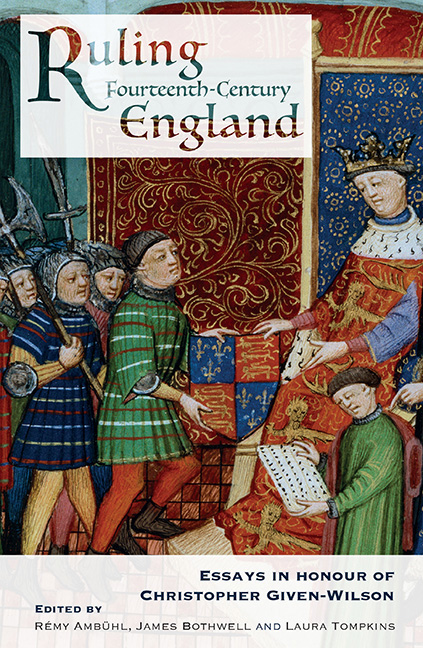Book contents
- Frontmatter
- Contents
- Contributors
- Abbreviations
- Introduction
- The Efficiency of English Royal Administration in the Last Years of Edward I
- Government and Market in the Early Fourteenth Century
- Kings' Clerks: The Essential Tools of Government
- Edward II: Favourites, Loyalty and Kingship
- The Perils of Lordship: The Life and Death of William Tuchet (c. 1275–1322)
- ‘War’, ‘Rebellion’ or ‘Perilous Times’? Political Taxonomy and the Conflict in England, 1321–2
- The Carlisle Roll of Arms and the Political Fabric of Military Service under Edward III
- What's in a Title? Comital Development, Political Pressures and Questions of Purpose in Fourteenth-Century England
- Edward the Black Prince: Lordship and Administration in the Plantagenet Empire
- ‘Said the Mistress to the Bishop’: Alice Perrers, William Wykeham and Court Networks in Fourteenth-Century England
- The Politics of Surrender: Treason, Trials and Recrimination in the 1370s
- Richard II in the Mirror of Christendom
- Bibliography
- Index
- Tabula Gratulatoria
Richard II in the Mirror of Christendom
Published online by Cambridge University Press: 18 September 2019
- Frontmatter
- Contents
- Contributors
- Abbreviations
- Introduction
- The Efficiency of English Royal Administration in the Last Years of Edward I
- Government and Market in the Early Fourteenth Century
- Kings' Clerks: The Essential Tools of Government
- Edward II: Favourites, Loyalty and Kingship
- The Perils of Lordship: The Life and Death of William Tuchet (c. 1275–1322)
- ‘War’, ‘Rebellion’ or ‘Perilous Times’? Political Taxonomy and the Conflict in England, 1321–2
- The Carlisle Roll of Arms and the Political Fabric of Military Service under Edward III
- What's in a Title? Comital Development, Political Pressures and Questions of Purpose in Fourteenth-Century England
- Edward the Black Prince: Lordship and Administration in the Plantagenet Empire
- ‘Said the Mistress to the Bishop’: Alice Perrers, William Wykeham and Court Networks in Fourteenth-Century England
- The Politics of Surrender: Treason, Trials and Recrimination in the 1370s
- Richard II in the Mirror of Christendom
- Bibliography
- Index
- Tabula Gratulatoria
Summary
Six and a half centuries after his birth, Richard II remains as intriguing and beguiling as ever. Scholarly interest in the king and his reign flourished around the sexcentenary of the revolution of 1399 and has shown little sign of flagging. Chris Given-Wilson, our honorand, has made a major contribution to building serious interest in the field, not least because his work has never been narrowly concerned with the king himself. His monograph on the royal household and king's affinity, published in the lean 1980s, provided a new frame, chronological and thematic, for an assessment of Richard's rule. His work on chronicles, notably his Chronicles of the Revolution and his exemplary edition of the Chronicle of Adam Usk, has provided a sound foundation for scholarship. If his approach to the chronicles is appropriately critical, Chris always pays them the courtesy of taking them seriously. For all their limitations, the chronicles provide insights on Richard's personality and politics which, though corroborated in other sources, would not be so evident without them. A good example is Richard's interest in English royal history. Three chronicles record separate incidents – the most celebrated being Adam Usk's report of Richard's lamenting England's record of regicide – that show the king's interest in antiquities and England's kings. Following in their wake, historians have revealed a king who had a strong interest in his heritage, the history of the crown and the legacy of the past. In a brilliant study, Chris himself showed Richard's historical consciousness in the late 1390s, in seeking not only to avenge his humiliation in 1387–8 but also to reverse the political outcomes of Edward II's reign.
In seeking to understand Richard's personal and political formation, this paper complements the focus on his interest in his royal predecessors by exploring his engagement with contemporary princes. It suggests that Richard's awareness of himself as a king among kings played a significant role in the development of his ideas about kingship and his sense of his destiny as ruler. England's kings naturally paid close attention to their French rivals, but Richard's relationship with Charles VI of France was unusually collegial and warm.
- Type
- Chapter
- Information
- Ruling Fourteenth-Century EnglandEssays in Honour of Christopher Given-Wilson, pp. 263 - 288Publisher: Boydell & BrewerPrint publication year: 2019



